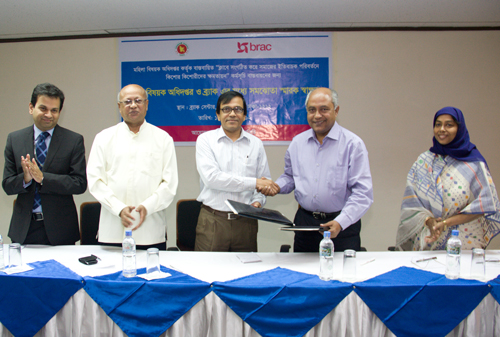
10 April 2012, Dhaka. In a unique event that highlights government and NGO partnership, a Memorandum of Understanding (MoU) is signed today between BRAC and the Directorate of Women Affairs. Under this MoU, the parties will work together to replicate the model of BRAC’s Adolescent Clubs in seven districts: Gopalganj,Sirajganj, Thakurgaon, Rangamati, Moulvibazar, Jhalokathi, and Chuadanga. The Government will be using this BRAC model, which has been replicated in Africa and currently has over 260,000 members in Bangladesh in establishing their own Adolescents Clubs to empower young women.
BRAC will provide technical assistance; prepare training modules, and other support materials that will play a crucial role in the implementation of this endeavour.
The MoU is signed by, Md. Ashraf Hossain, Director General, Directorate of Women Affairs and Dr Safiqul Islam Director, BRAC Education Programme.
Executive Director Dr. Mahbub Hossain mentioned that NGOs shows innovative and effective path to implement a goal, but to bring out the positive impact in large scale government has the capability ; NGOs can work with government in root level and by working together synergic result will be produced. He believes that adolescent clubs will bring positive changes and uphold the gender parity in the society.
Md. Ashraf Hossain, Director General, Directorate of Women Affairs mentioned that Government has adopted National Women Development Policy (NWDP). Their road map is to transform the society from patriarchy approach to gender equality. This signing ceremony will work as milestone towards their goal.
Director of Communications Asif Saleh, Deputy Director of Directorate of Women Affairs Zakia Yasmin Zoardar, Programme Coordinator of BRAC Education Programme Md. Monowar Hossain Khondakar, BRAC Adolescent Programme Manager Rashida Parveen were also present.
Currently BRAC runs more than 8,000 Adolescent Clubs for young women from underprivileged backgrounds. The clubs offer adolescents life skills based education- facilitated by their peers – that focus on different social and health related issues, such as reproductive health, sexual abuse, children’s rights, gender, HIV/AIDS, STI, eve teasing (verbal sexual abuse), child trafficking, substance abuse, violence, family planning, child marriage, dowry, and acid throwing. Kishori Kendros provide the opportunity for girls to learn valuable skills by offering Livelihood Training courses on tailoring, embroidery, journalism, poultry, livestock, and beauty care to empower individuals to become financially independent.
Research findings show how ADP – Adolescent Peer Organized Network (APON) course graduates become empowered in terms of participation in and control over decision making and in nurturing leadership qualities to be the agents of social change. The study also captured how the target groups’ attitudes towards early marriage, dowry, reproductive health knowledge, health seeking behaviour, knowledge on HIV/AIDS along with other STDs, awareness on social and gender perceptions vary from the general adolescents nationally.








